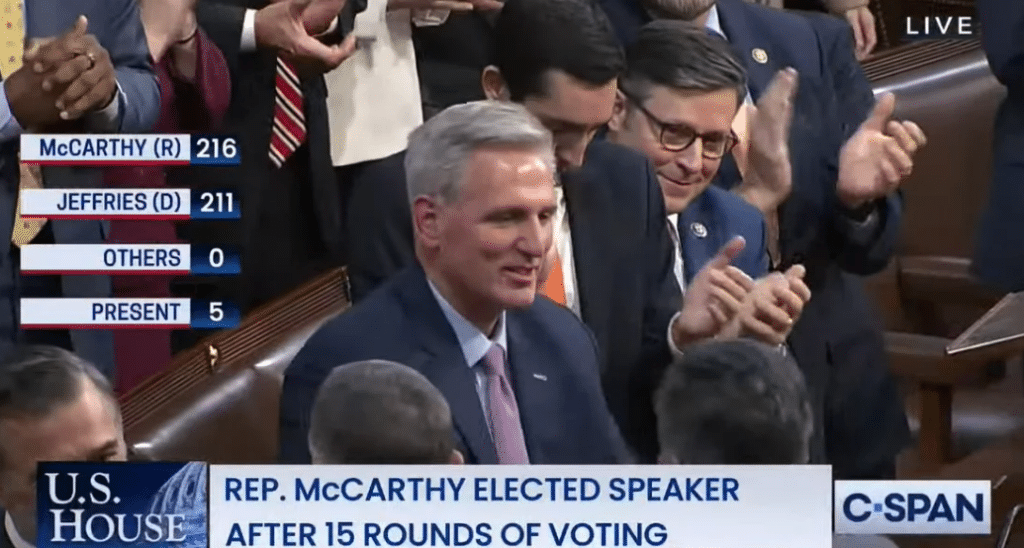
Kevin McCarthy wanted the Speakership enough to eventually give in to the members of the conservative caucus to win it.
Kevin McCarthy is not trusted.
Matt Gaetz said early on that this only ends one of two ways.
Watch:
We got the Second Option.
So, what did we get in that Rules Package?
This list of concessions that McCarthy gave to the conservatives reportedly included the following:
- Members of the conservative House Freedom Caucus got commitments to be added to the Rules panel. The committee exerts tremendous power by setting the terms of debate but usually operates as a tool of the Speaker. (It traditionally has a 9:4 ratio, so the majority never loses).
- McCarthy had already agreed to a five-vote requirement to make the motion, which sets up essentially a vote of no-confidence in the Speaker and agreed to lower it to a single lawmaker.
- McCarthy agreed to take a hard line on increasing the statutory debt limit – which Congress must lift to accommodate spending it has agreed to through appropriations.
- The holdouts reportedly got a pledge to get floor votes on term limits and border security. The former in particular could drive a wedge through the conference. McCarthy himself was elected to the House in 2006.
- The Conservative Leadership Fund, a PAC backed by McCarthy, brokered a deal with the Club for Growth that will impact Republicans that join the House in the future. The CLF committed to stay out of ‘open’ primaries when a lawmaker vacates a seat. That gives arch-conservatives a chance to prevail in a primary without getting pounded by leadership, which sometimes weighs in on behalf of candidates deemed more ‘electable.’
- McCarthy reportedly agreed to allow ‘open rules’ on spending measures, which could lead to lengthy debates and efforts to zero out funding for programs unpopular with Republicans.
- Another concession is a cap on discretionary spending, CNN reported. although spending levels are usually negotiated by both chambers – and get influenced by the president’s budget requests.
- Republicans are girding to take on the Biden administration, and the conservatives forced a commitment to set up a committee on the ‘weaponization’ of the DOJ. The idea had been floated as a subcommittee on the House Judiciary Committee. Its exact structure and membership were uncertain.
This last bullet may be the most important one that the Democrat socialists are the most concerned about.
Far-left Politico reports:
A proposed subcommittee to investigate “weaponization” of the federal government — a key demand of House conservatives who delivered Speaker Kevin McCarthy the gavel — would be given sweeping investigatory powers that include explicit authority to review “ongoing criminal investigations.”
The language of the proposed “select subcommittee,” which would operate under the Judiciary Committee expected to be chaired by Rep. Jim Jordan (R-Ohio), also gives the panel power to access any information shared with the House Intelligence Committee. That panel typically receives the highest-level classified intelligence and briefings of any committee in Congress.
Both provisions appear to have been added during final negotiations between McCarthy and a band of hardline detractors that briefly denied him the speakership. An earlier version of the proposal made no mention of ongoing criminal investigations or the Intelligence Committee and limited the probe to the FBI, Department of Homeland Security and the Department of Justice.
In his acceptance speech, McCarthy announced that the left’s hiring of 87,000 IRS agents will be tackled first.
Representative Kevin McCarthy of California was voted Speaker of the House late Friday night after 15 rounds of voting, and in his acceptance speech he said the first act of the 118th Congress under his leadership will be to “appeal the funding for 87,000 new IRS agents.”
“I know the night is late,” McCarthy said. “But when we come back, our very first bill will appeal the funding for 87,000. You see, we believe government should be to help you not go after you.”
Watch:
Western Journal reported:
Another concession given is that there must be 72 hours given to review bills before they come on the floor. Given the sheer density of some bills that come through, that, again, seems more than fair.
If you want the full report, you can read it direct from Rules.House.Gov.




